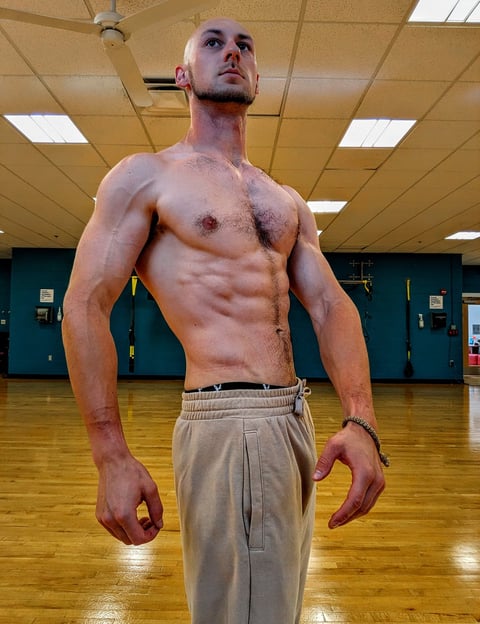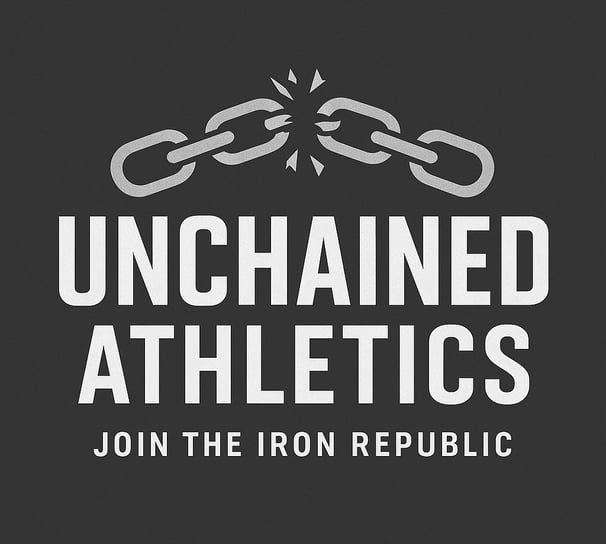At 18, I couldn’t wait to start a muscle-building program. After years of playing baseball year-round, I was lean and athletic, but always struggled to put on size. When I graduated high school, I weighed just 140 pounds. That’s when I became obsessed with lifting — hitting the gym 5 to 6 days a week, doing endless sets and high-volume training because that’s what all the so-called fitness “experts” recommended.
At first, I was all-in. I gave everything I had. But after about two years, the results stopped. I hit a wall I couldn’t break through. I was constantly fatigued, sore, worn down. My joints ached so badly I could barely do a push-up without pain. Yet every time I looked for guidance, the answer was always the same: "Do more."
But I was already doing everything — how could I possibly do more? Still, I trusted the experts. And it only made things worse. Eventually I was completely burnt out — mentally and physically. I quit the gym altogether and didn’t go back for over three years. During that time, I slipped into unhealthy habits and a sedentary lifestyle.
One day as I looked at my gut, I decided enough was enough. I made the decision to take control of my health again — but I knew I had to do it differently this time. I dove deep into research, studying basic human physiology and how our ancestors lived. What I learned changed everything.


Q: Do I really only need to train 2-3 days a week?
Q: How long are the workouts?
Q: What kind of equipment do I need?
Q: Is this program for beginners or experienced lifters?
Q: Is this program for men, women, or both?
Q: As a woman, won't lifting weights make me big and bulky?
Q: Will I still get results training less often?
Q: Do you provide nutrition guidance along with workout plans?
Q: Can I still train other days if I want to?
Q: How can I lose weight without tracking calories?
A: Yes. If done properly, training twice a week with focused intensity is more than enough to build strength and muscle. It's not about how often you train, but how effectively.
A: Absolutely. Most people don't lack effort - they lack recovery. The Unchained way teaches you how to actually grow between sessions by learning how to recover properly.
A: Both. The principles work for any level because they're rooted in how the human body actually functions. Your program will always be tailored and adjusted for your starting point.
A: Of course! I keep it simple and grounded in how we're designed to eat - fewer meals, more nutrients, less confusion. I don't push products, I push an effective lifestyle.
A: Each workout lasts 45-60 minutes. That's it. No fluff, no filler - just efficient, high-intensity training that gets real results.
A: Sure, but its not necessary. If you're recovering well and want to stay active, there is nothing wrong with daily exercise, just don't turn exercise into a full blown training session.
A: Absolutely NOT. This is a very common myth. I hate to break it to you ladies, but "She-Hulk" is out of the cards unless you want to take steroids!
A: Both! Whether you're male or female, the principles stay the same: train hard, rest hard, grow strong.
A: The body was designed to go without food for periods of time. Fasting taps into stored fat, balances hormones, and resets hunger signals. Eating a natural human diet keeps you full for much longer, and sustains energy levels. Throw away your calculator and burn it!
A: All you need access to is a basic gym setup - free weights, a few machines, and your own effort. For those not quite ready to go into high-intensity training, a gym will not be necessary to start.
FAQs
The fitness industry had it backwards.
The idea that "more is better" just isn’t true — at least not for the average, natural lifter. High-volume training routines stem from the golden era of bodybuilding, where performance-enhancing drugs allowed pros to recover faster and train endlessly. But for the rest of us, that approach is a fast track to burnout and injury.
The body doesn’t grow from doing more. It grows from doing the right things, with intention and proper recovery. Progress comes when you train hard, then let your body rebuild stronger. That’s the real key — and it’s been hiding in plain sight.
But it went further than just the training. I started questioning everything I thought I knew about nutrition. I used to eat over 250 grams of carbs per day, thinking it was necessary for energy and performance — because that’s what everyone in fitness circles were saying. But when I considered how humans have eaten for most of history, it made perfect sense... Our ancestors didn’t rely on constant carb intake. There were no grocery stores or food on demand. They hunted for their meals, often going long stretches without eating. And yet, they were capable of tracking and taking down wild animals — on foot, without weapons, without pre-workout drinks, and certainly without a belly full of rice and pasta.
That’s when I began to understand the power of fasting, how the body heals and regenerates during those periods of rest, and how growth hormone spikes naturally in a fasted state. I started eating more simply — meat, eggs, a bit of cheese. No processed junk. No constant snacking. I stopped feeling hungry all the time. I now train intensely after 36 to 40 hours of fasting, work long days on a farm, and feel stronger and more energized than I ever did when I was loading up on six meals a day.
This approach turns the modern fitness narrative on its head. The truth is, health doesn’t come from doing more or adding more — it comes from removing what’s unnecessary. The toxic foods, the over-training, the constant stimulation — all of it gets in the way. Strip it down to the essentials, and your body will thrive. Eat like a human. Move like a human. That’s when everything changes.
Today, I train just twice per week, giving myself 3–4 days of recovery between sessions, and I’m in the best shape of my life. No more 2-hour gym sessions. No more chasing the “grind.” Just smart, simple, effective training.
That’s why I created Unchained Athletics — to break people free from the exhausting, unsustainable routines that dominate the fitness world. Getting in shape doesn’t require living in the gym. It just takes simplicity, guidance, and consistency.
In a world where most people are overworked, overwhelmed, and overstimulated, your fitness routine should work for you — not the other way around. You have a life: a family, a job, responsibilities and obligations. Your time is valuable, I’m here to show you a better way.
When your body is strong, your mind follows. You’ll live confidently. Think more clearly. Confidence grows when strength grows — and that strength comes from living in alignment with how we’re meant to operate: naturally, simply, and intentionally.
This is fitness with purpose. This is Unchained.
- Travis Powers
"Travis helped me take control of my health through consistency and simplicity. The structure of the training didn't just change my body, it reshaped my mindset. I carry that confidence with me everywhere now, feeling better every day."
-Pete N.

